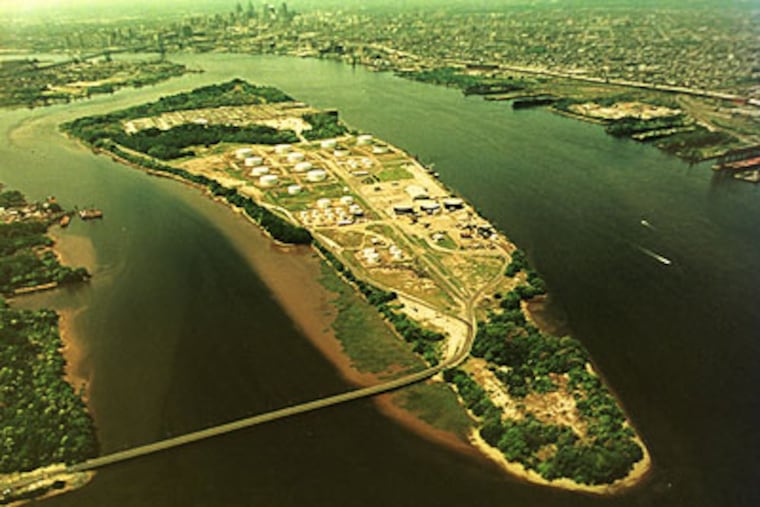Pennsauken seeks new riverfront-development deal
A year after New Jersey declared Petty's Island a conservation area, making it the final nail in a failed $1 billion redevelopment project on Pennsauken's waterfront, township officials are in talks with another developer.

A year after New Jersey declared Petty's Island a conservation area, making it the final nail in a failed $1 billion redevelopment project on Pennsauken's waterfront, township officials are in talks with another developer.
Preliminary plans for the scaled-down project call for construction of condominiums, single-family homes, and retail and office space on 350 acres of active and vacant industrial land on the banks of the Delaware River, said Pennsauken Administrator Ed Grochowski.
The talks with developer Vineland Construction, owner of 40 percent of the site, represent the latest go-round in a decades-long effort to bring commerce and upscale housing to a mile-and-a-half stretch between Bethel Avenue and 36th Street.
Vineland Construction president John Krauser declined to be interviewed. Grochowski said that if the developer and township were to finalize a deal, construction would be at least a few years off as they waited out the recession.
"The market is still there. It's just a matter of the economics," he said. "Is the money there to borrow, to move forward?"
While the project is far from certain, the town's outlook is more positive than it was two years ago, when Cherokee Investment Partners of Raleigh, N.C., pulled out after years of controversy over its Pennsauken plans, which included a golf course, hotel complex, and homes on Petty's Island.
Citgo Petroleum Corp. had offered to donate the 392-acre island, where it once operated a refinery, as a nature preserve in 2004. But the state Natural Lands Trust initially rejected the proposal, which fell within Pennsauken's proposed redevelopment zone.
That set off a debate between environmentalists and development interests, which eventually centered on a pair of bald eagles that had nested on the island.
Vineland Construction, which owns 140 acres along Pennsauken's riverfront, itself filed a lawsuit against the township after it was passed over as developer and its land appeared likely to be seized through eminent domain.
But Cherokee's proposal lost steam in 2008 when the state Inspector General's Office released a report accusing a subsidiary of misrepresenting its experience in a project to clean up the Meadowlands landfills and convert them into a golf, housing, and shopping complex.
The U.S. Attorney's Office later subpoenaed records on three Cherokee projects: the Pennsauken waterfront, the Meadowlands, and the redevelopment of Camden's Cramer Hill neighborhood.
With Petty's Island now a preserve and Cherokee out of the picture, Vineland Construction has signed a memorandum of understanding with Pennsauken to study the mainland property and negotiate a deal, Grochowski said.
As a brownfields site, the development zone will require extensive cleanup, said Jeff Tittel, director of the New Jersey chapter of the Sierra Club.
"We always felt the development on the waterfront should happen, just in a responsible way," he said. "A lot of those wetlands [along the Delaware] are important for wildlife."
Pennsauken resident Betsy McBride, who founded the citizens' group Pennsauken Taxpayers for Reclaiming the Waterfront and championed the Cherokee project, said she was encouraged to hear about another interested developer but continued to hope that any development would provide public access to the river and preserve woods along the banks.
"Presently, there's no access to the river for the people of Pennsauken," McBride said. "We could attract the young professionals and the empty nesters with that view alone. It's the best view of Philadelphia there is."
Across South Jersey, redevelopment projects sit on hold, victims of the economy and intense competition for financing.
Palmyra's plans to turn a former landfill site on the river just north of the Betsy Ross Bridge into condos, offices, and shops recently returned to limbo after the developer pulled out to pursue a project in Burlington City.
Grochowski maintains that the Pennsauken location gives the township an advantage.
"There's only so much waterfront property. And everyone wants to be on the water," Grochowski said. "And we have the light-rail line stopping at the 36th Street station, which could be a transit center."
Of the redevelopment zone's 350 acres, the township and Vineland Construction own a combined 160. The remainder will have to be purchased through negotiations with property owners including the Hess and Texaco oil companies, or taken through eminent domain, Grochowski said.
Two years ago, Chris Wang, a principal in a family scrap-metal business, bought River Road Recycling despite the fact that the property sits in the redevelopment zone.
"The way the economy is and the general location, we didn't see it as likely to happen," he said. "It looked like a done deal when we took over."